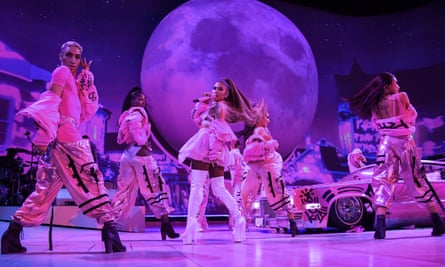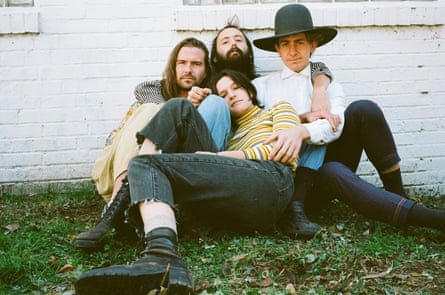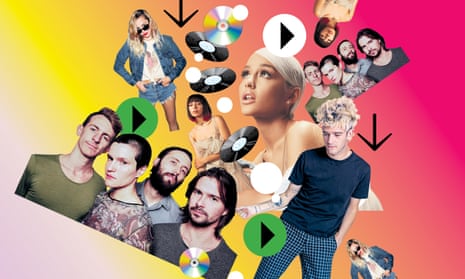The music industry in 2019, says Foals frontman Yannis Philippakis, could be compared to a Pez dispenser. He is not talking about big heads – rather, the seemingly endless, instantly gratifying stream of new songs that drop each week, like tiny pieces of Pez candy. “It certainly feels as if there’s more music out there,” he says. “By virtue of that, a record just feels older quicker; it doesn’t have its place in the sun for long, because there’s new canopy growth. Everyone’s trying to get a bit of sunshine.”
Philippakis is among a growing number of artists responding to this fast-moving dynamic by upping the pace of his releases. Foals will release their second album of 2019, Everything Not Saved Will Be Lost Part II, in October (Part I was released in March, and nominated for this year’s Mercury prize). The New York indie band Big Thief release Two Hands, their second LP of the year, this October. The 1975 are beginning to roll out their 2020 album Notes on a Conditional Form just eight months after releasing A Brief Inquiry Into Online Relationships.

For many artists who release independently, whether they are rappers dropping mixtapes or punks with tape labels, fast-and-furious releases are nothing new. But even major-label pop stars are at it. Ariana Grande released her album Thank U, Next just six months after her previous LP, Sweetener; within two months, she had moved on again, releasing the non-album single Monopoly, later followed by Boyfriend, and is now at No 1 with Don’t Call Me Angel, a collaboration with Miley Cyrus and Lana Del Rey. This month, before listeners had barely had a chance to hear all of Del Rey’s new album, Norman Fucking Rockwell!, she announced that her next record, White Hot Forever, will arrive as a surprise release within the next year.
The studio album was once the industry’s most valued commodity. Back in 2000, the US music industry earned 92.3% of its revenue from the sale of CD albums. It was the peak of the format’s power since its introduction by Columbia Records in 1948. Leaving behind the singles-focused culture spearheaded in the 50s by A&Rs such as Phil Spector, the album hit new levels of commercial and cultural significance in the 60s with the Beatles. Initially, albums were released at the same breakneck pace as singles had been in the 50s, but by the 70s, the rate had slowed as the album became the most revered form of musical expression. “Judgments were simpler in pop’s early days, partly because rock’n’roll was designed to be consumed in three-minute take-it-or-leave-it segments,” wrote famed critic Robert Christgau in Christgau’s Record Guide in 1981. “The rise of the LP as a form – as an artistic entity – has complicated how we perceive and remember what was once the most evanescent of the arts.”

But today, the pace has “completely returned to a hit-driven model,” says Jamie Oborne, manager of the 1975 and head of their label, Dirty Hit Records. “We’ve returned to the days of the 50s or 60s, where people are just smashing out singles in the hope that one sticks. There is a lot of output that is just about building consumption.”
In the first half of 2019, streaming accounted for 80% of the industry’s income from recorded music. Paul Trueman, general manager at independent label and distribution company Awal, explains how this has shifted industry priorities: “Historically, there was a big focus on week-one sales, and a lot of effort was put in prior to release in setting the album up.” This can still be important for marketing, he says, but the album release itself is less important than creating a continuous flow of videos, remixes and sparkling new content.
This creates a different kind of pressure for artists: to produce enough material to get constantly playlisted and talked about, saving yourself from being kicked to the bottom of Spotify’s New Music Friday heap each week. This is especially gruelling for pure pop acts. Think of Charli XCX, who drip-feeds her audience with near-constant mixtapes and loosies, and neo-flamenco singer Rosalía, who has put out a two-song single, a standalone track and two high-profile collaborations since her last album, El Mal Querer, in late 2018.

The German pop star Kim Petras is known for her prolificacy, a topic she discusses with plainspoken breeziness: “You just have to constantly drop new stuff.” Petras has independently released two EPs and earlier this year shared an album-length “project” titled Clarity, which she promoted by releasing a song every week for 10 weeks. “As new artists, it’s a really amazing way to gain a fanbase,” she says. “Releasing songs, almost like it’s a TV show, monthly or weekly.” She says this is her way of “staying on top of people’s minds … It’s a great way to make your fans feel really connected to you now that there are thousands of songs coming out every week.”
But Oborne says there are more existential reasons behind the 1975’s decision to release two albums in quick succession. He says he and the band’s frontman Matt Healy have the feeling that “we’re kind of running out of time. I would put some of that down to the shape the world is in, how scary it is.” He says meeting and collaborating with the environmental activist Greta Thunberg and her family this year injected the band with a sense of urgency to move as quickly as possible to “use Matthew’s platform in a conscientious way”. If you’re writing about topical issues – Healy’s songs reference the climate crisis, politicians, even viral tweets – the material is best released quickly.
Even if you’re not, many artists feel liberated by releasing music before it becomes old news to them. When a fan lamented on Twitter that Grande’s Sweetener era was already “over” when she announced Thank U, Next in late 2018, the star responded: “It ain’t ova! i don’t really like ‘eras’. i jus wanna make music and drop it … i want to share it w u when it’s freshhh.” She would tell Billboard that she dreamed of releasing music “in the way that a rapper does. I feel like there are certain standards that pop women are held to that men aren’t.”

Like Grande, 4AD-signed band Big Thief are so prolific that it is a relief for them to share what they have made quickly: they had written the whole of their 2017 album Capacity before they even released 2016’s Masterpiece. “You don’t want fresh stuff to feel like it’s getting stale,” says their drummer James Krivchenia. “By the time you’re recording it, you want to make sure that the thought and the emotion behind the song in the first place still exists in this person saying it, and they haven’t moved on to another phase of life.”
The band’s two 2019 albums, UFOF and Two Hands, were created simultaneously, but always intended as separate bodies of work. A double album was out of the question. “A lot of the songs would get lost,” Krivchenia says. The band decided to record the albums in two “distinct, but similar processes”, making UFOF near Seattle, then heading into the desert a few days later for Two Hands, and recording each one on different kinds of tape.
Even though they are naturally productive, Krivchenia says the industry has often demanded even more of the band. “We’ve had labels be like: ‘Do you want to put out the demos, or extra songs?’ There is a hunger for extra for the sake of extra – Spotify singles, or bonus tracks.” Where does that pressure come from? “I think it’s people worried that you’re going to be forgotten, that you’re going to get lost in the internet swarm of music after the album comes out. But it seems a bit ass-backwards to be worrying about – if you’re nervous about being forgotten, then I think you should try and make really good music. That’s where our focus is.”
Foals’s Philippakis also believes there is a greater demand for artists to create as much as possible to fill streaming services, which is a direct reverse of the situation that Foals were in a decade ago. “There was a period when iTunes was the main gatekeeper,” he remembers, “and they would stop paying after a certain amount of tracks on a record. In general, labels were dissuading artists from making longer albums, because you didn’t get paid for the extra tracks. Streaming has totally dismantled that.” Had Foals ever approached their label with two albums’ worth of material in the past, he imagines, they would have been met with “raised eyebrows: ‘Is this your Use Your Illusion?’ Also: ‘There’s no point doing that, because financially it’s not going to make sense for the label.’”
However, that is not why Foals decided to release a two-part album. Albums generally are “afforded oxygen in the world for a shorter space of time,” says Philippakis. “You spend two years making an album, and then you have the initial excitement and release; obviously, hardcore fans will stay with it for longer, but in terms of general ability to be part of the cultural thread, I don’t feel that it lasts as long.”

Perhaps the traditional album cycle is no longer suited to a world in which creators and consumers want everything to happen much more quickly. Is it any great loss? “We’ve been frustrated with the album cycle for a while,” Philippakis admits. “There’s something that is artistically not honest about putting out expressions of yourself every couple of years, and having all the scrutiny, and that being viewed as your definitive expression.”
Ideally, they would move away from the album cycle model altogether. “What we’d like to do would be to go into the studio and record two or three tracks at a time, release them, tour those, then go back into the studio. For the whole process to be more nimble, rather than these huge, quite laborious periods where you tour to quite an extreme extent, and making an album is a two-year commitment where you have to summon all this creative energy in one go.”
He compares making an album to writing a novel. “This big kind of pregnancy. There’s a scale to all of it that’s quite demanding. It doesn’t need to necessarily be like that.”
Krivchenia also isn’t a fan of the traditional album cycle. “It’s a pretty random benchmark in the first place,” he says. Yet he thinks the format will last a long time. Striving to make something cohesive that’s 30 to 40 minutes long is a “nice, useful constraint”. While Philippakis wants to experiment with a more fluid releasing and touring process, he says Foals will definitely keep making albums. Oborne describes how his 12-year-old daughter, a streaming fanatic, recently got really into an album for the first time thanks to Billie Eilish – proof to him that even in a time of “instant-grat culture”, albums are “always going to be important”.
And while Petras hasn’t announced an album yet, she sees it as the goal: “I’m trying to be a touring artist and an album artist, I want my fans to listen to my projects fully, from top to bottom.” She points to the R&B singer the Weeknd as a hero of hers, who released three stellar mixtapes before putting out an LP. Like him, she says, she wants to be at her “pinnacle” when she gives fans her first album. “I’m building up to it. I’m not chasing a hit song; I’m chasing a career.” The album, it appears, is still the thing to chase if you want to be a serious artist – you just have to be ready to run faster than ever.

Comments (…)
Sign in or create your Guardian account to join the discussion